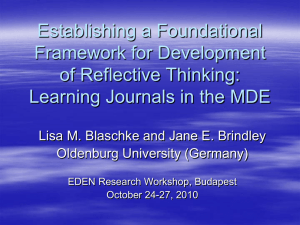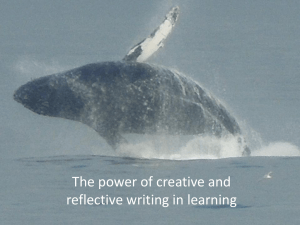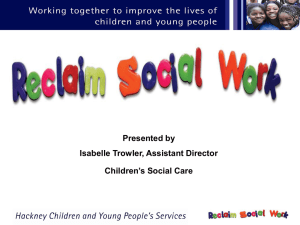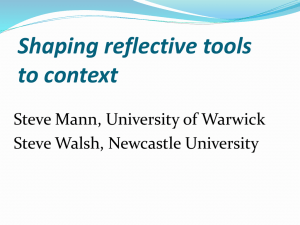REFLECT ON PRACTICE - Community Advocacy & Legal Centre
advertisement
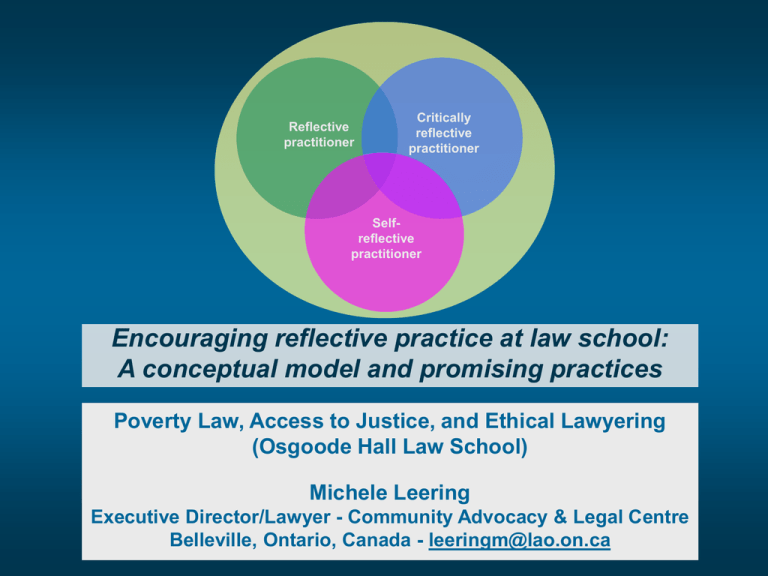
Reflective practitioner Critically reflective practitioner Selfreflective practitioner Encouraging reflective practice at law school: A conceptual model and promising practices Poverty Law, Access to Justice, and Ethical Lawyering (Osgoode Hall Law School) Michele Leering Executive Director/Lawyer - Community Advocacy & Legal Centre Belleville, Ontario, Canada - leeringm@lao.on.ca Key messages from Encouraging reflective practice at law school: A conceptual model and promising practices • Reflection is critical for learning • Reflective practice is an important capability at every stage of professional development (student professional) • Facilitating reflective capacity early and pervasively benefits everyone • Access to justice work is enhanced by reflective practice “I think it is actually cutting edge, it ought to be explored.” Encouraging Reflective Practice - Osgoode Symposium 2011 Research participant 2 What is Reflection? Why Care About Reflective Practice? • • • • • A more effective adult learner Healthier and happier student/professional Supports ethical development Awareness of cultural incompetence Increases sensitivity and commitment to social justice and access to justice issues • Encourages transformational learning Encouraging Reflective Practice - Osgoode Symposium 2011 7 Why Care About Reflective Practice? • Enhances critical lawyering skills & capacities • Efficient and effective legal professional • Holistic practitioner – law as a “healing profession” • Builds flexibility, resilience, and leadership capacity Encouraging Reflective Practice - Osgoode Symposium 2011 8 If you had many members of the profession who were reflective practitioners, in particular selfreflective practitioners, I think you would actually see differences in what are accepted as the predominant norms of the profession itself. Research participants’ views Anybody who is more reflective is less likely to be a discourteous, uncivil professional I think that it’s something we are going to hear more about and I think that law faculties that evolve to adopt these kinds of tools and methods will be better law faculties. Encouraging Reflective Practice - Osgoode Symposium 2011 9 What is reflective practice? 1. The literature review 2. Interviewing law professors Reflection: An Evolving Recognition of its Critical Contribution to Learning Dewey (1934) Reflection & Thinking Mezirow (1979) Reflection & Transformational Learning Schön (1983, 1987) Reflective Practice & Professional Development Boyd & Fales (1983) Reflective Learning Kolb (1984) Boud et al (1985) Experiential Learning & Reflection Reflection & Learning from Experience Encouraging Reflective Practice - Osgoode Symposium 2011 Brookfield (1995) Critical Reflection Moon (1999) Reflection & Professional Development 11 Donald Schön and Reflective Practice McNiff, J., & Whitehead, J. (2006). All you need to know about action research. Thousand Oaks, CA: Sage. Encouraging Reflective Practice - Osgoode Symposium 2011 12 Views of Research Participants “A reflective practitioner is somebody who considers who they are, where they are, what they’re doing, their position in the community, the purpose of the work they are doing and how they are doing it, and takes it as an ongoing process of learning and moving forward… a continuous iterative process” Encouraging Reflective Practice - Osgoode Symposium 2011 The ability to engage in critical selfreflection about one’s professional role and experiences is an important and learnable skill which is arguably the key to continuous learning throughout a lawyer’s career. 13 Views of Research Participants RP means for me the opportunity to reflect in a fairly systematic and intentional way about what has been donewhat has worked, what hasn’t worked, what was successful, why was it successful or not successful, and learn from that reflection, continually adjusting the practice in ways in which you will imagine, and it will be made better as a result of reflection. Encouraging Reflective Practice - Osgoode Symposium 2011 ..a bigger definition of RP has one reflect not simply on the skills that one’s acquiring, whether it’s to think critically or analytically, or more effective questioner, listener or interviewer, but it’s to reflect on the role of law in society. It’s to reflect on the implications that law will have on groups within society. 14 Setting the Aspirational Vision: Creating a working definition for reflective practice in legal education and for the legal profession Reflective practitioner (traditional) REFLECT ON PRACTICE Encouraging Reflective Practice - Osgoode Symposium 2011 16 learn from experience Schön skill Reflective practitioner integrate theory & practice action Encouraging Reflective Practice - Osgoode Symposium 2011 17 learn from experience technical practical Schön craft skill Reflective practitioner integrate theory & practice “think like a lawyer” “hands” professional discipline action Encouraging Reflective Practice - Osgoode Symposium 2011 18 legal reasoning technical ‘artistry’ Learning from experience practical Schön legal practice craft Reflective practitioner skill instrumental integrate theory & practice ‘single loop’ “think like a lawyer” learning make ‘tacit’ explicit professional discipline competency cognitive analytical apprenticeship Encouraging Reflective Practice - Osgoode Symposium 2011 19 Critically reflective practitioner REFLECT ON KNOWLEDGE & CRITIQUE Encouraging Reflective Practice - Osgoode Symposium 2011 20 challenge the status quo knowledge Critically reflective practitioner critical legal “head” studies law as a social construct critique intellectual Encouraging Reflective Practice - Osgoode Symposium 2011 21 unpack assumptions & paradigms emancipation challenge the status quo knowledge ‘double loop’ learning (Arygris/Schön) “head” theoretical Critically reflective practitioner critical legal conscientization (Freire) critical race theory feminist analysis studies ‘liberal’ education law as a social construct critique intellectual transformative Intellectuals (Giroux) practicing theorist (Buchanan) context deconstruct Encouraging Reflective Practice - Osgoode Symposium 2011 “enlargement of mind” (Nedelsky/Arendt) 22 Self-reflective practitioner REFLECT ON “You can’t grow, you cannot SELF learn, you& cannot shift, you cannot respond without self-reflection.” AS PROFESSIONAL Research participant Encouraging Reflective Practice - Osgoode Symposium 2011 23 self-awareness “heart” personal Self-reflective practitioner values moral commitment ethics Encouraging Reflective Practice - Osgoode Symposium 2011 24 emotional and social intelligence self-awareness engagement personal Self-reflective practitioner philosophy of practice introspection values moral commitment insight ethics self- regulating Encouraging Reflective Practice - Osgoode Symposium 2011 25 3 Key Components Reflective practitioner Critically reflective practitioner Self-reflective practitioner Encouraging Reflective Practice - Osgoode Symposium 2011 26 3 Key Components Reflective practitioner Critically reflective practitioner Self-reflective practitioner Encouraging Reflective Practice - Osgoode Symposium 2011 Integrated Reflective Practitioner (IRP) 27 Integrated Reflective Practitioner • • • • • • • • • engaged … is self-aware and can reflect on practice, knowledge and critical theory as a self-directed life-long life-long learner learner, and takes action to improve his/her practice, and reflects in ethical community. Reflective practice becomes a “way of being”. (Palmer) holistic approach “authentic” “new” professional a “way of being” integrated knowledge, skills, values reflects collectively Encouraging Reflective Practice - Osgoode Symposium 2011 28 Reflecting In Community Reflective practitioner Critically reflective practitioner Self-reflective practitioner Encouraging Reflective Practice - Osgoode Symposium 2011 Integrated Reflective Practitioner 29 The Aspirational Vision Reflective practitioner Critically reflective practitioner Self-reflective practitioner Encouraging Reflective Practice - Osgoode Symposium 2011 Integrated Reflective Practitioner (IRP) 30 Methods to increase reflection • • • • • Identify suitable methods Experiment with methods (action research) Be intentional and explicit with students Model your own reflective practice Share your knowledge & expertise – new scholarship or innovative pedagogy Encouraging Reflective Practice - Osgoode Symposium 2011 31 Some methods - Research participants • • • • • Learning contracts Learning plans Learning styles assessment Rubrics for self-assessment Debriefing – OPIR group debriefs – Experiential learning – Group work – Role plays • Ethical ambassador • Experiential (field trips, exercises, intensives) • Problem-based learning – Innovative use of novel • • • • • • • • Mind-mapping Reflective questions Syllabus expectation Use of metaphor Innovative teaching methods Co-curricular activities Critical reflection on readings Reflective writing – Journaling – Summaries of key learning points – One minute papers – Reflective essays – Personal code of conduct • Teaching portfolios Encouraging Reflective Practice - Osgoode Symposium 2011 32 Methods to support reflection See Mind Map # 2 (Resource Kit) • Orientation • Pre-orientation Reflective exercises • Planning exercises • Reflective writing • Reflective questioning • Self-awareness exercises • Reading theory critically • Experiential learning • “Actual” • “Staged” • • • • • • • • Course offerings Graphic exercises Contemplative practices Debriefing exercises Consciousness-raising Aesthetic Mentoring programs Assessment & evaluation methods • Group process • Faculty models RP! • Innovative teaching methods Encouraging Reflective Practice - Osgoode Symposium 2011 33 Opportunities at Law School to encourage reflection Clinical Legal Education Programs Lead the Way Encouraging Reflective Practice - Osgoode Symposium 2011 35 “I think it’s cutting edge, it really ought to be explored” - Research Participant Encouraging Reflective Practice - Osgoode Symposium 2011 36 A pervasive approach – Strategic alignment Faculty Experiential learning Law school admissions Extra & co-curricular activities externships orientation Clinical Programs Academic Success Program Assessment & Evaluation Encouraging Reflective Practice - Osgoode Symposium 2011 Modeling Learning outcomes / core competencies Courses Career Services Department Strategic plan Faculty Professional Development 38 Closing Key Messages for Faculty • • • • • • Use at least one method to encourage reflection Share your promising practices Build on existing promising practices Nurture your own reflective practice Create a community of practice Create new knowledge about teaching (scholarship about pedagogy, action research) • Model reflective practice for students Encouraging Reflective Practice - Osgoode Symposium 2011 39 Resource Kit Available • • • • • • • • • • • • Introductory memo to Resource Kit materials Working Conceptualization for RP Mind Maps: Benefits/Outcomes & Methods Planning Tool “Where I want to Be” Adapted from Fritz (1999) Sample Resource for Law Students: Reflective Journaling Annotated Resources & Bibliography (work in progress) “Ten Actions of a Reflective Practitioner” (Adapted from Kinsella, 2001) Collection of quotes to reflect on Matrix for planning reflective activities Glossary of Terms (adult & higher ed lexicon) For more information: leeringm@lao.on.ca These documents can be found online at: http://www.gaje.org/abstract-michele/ Encouraging Reflective Practice - Osgoode Symposium 2011 40 What does reflective practice mean to you? “When I am at my best, my teaching is like a ___________.” Parker J. Palmer, The Courage to Teach: Exploring the Inner Landscape of a Teacher’s Life (San Francisco: Jossey-Bass, 1998), p. 148 Encouraging Reflective Practice - Osgoode Symposium 2011 41 There is a crack in everything That's how the light gets in. – Leonard Cohen in “Anthem” Encouraging Reflective Practice - Osgoode Symposium 2011 42


